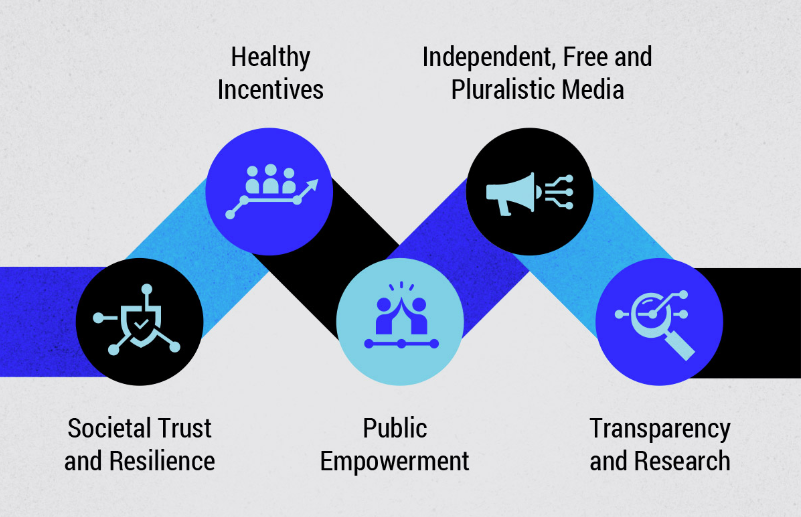By Michiel Kolman and Rachel Martin
Back in June 2024, the United Nations launched a set of global principles for information integrity. The aim is to help prioritize and coordinate international action needed to tackle the issues of misinformation and disinformation. The World Economic Forum considers disinformation to be the world’s top risk over the next two years. The question for publishing is, what role do we play in helping to safeguard the truth?
What is information integrity?
Let’s start at the basics. Information integrity refers to how trustworthy a piece of information or content appears to be. However, when referring to how content is shared, false information is either shared online unintentionally (i.e. misinformation) or it can also be shared deliberately in the case of disinformation. When false information is shared it erodes the trust, we have in our society and our institutions. Famous examples of both misinformation and disinformation can be found when thinking of big events such as Brexit, COVID vaccinations and various political elections.
The main problem with misinformation and disinformation is that while digital technology has benefited our society in many ways, it has also changed how we understand, and are exposed to information. Forbes reports an estimated 50% of internet users say they hear the latest news story via social media before hearing about it on the news.
Taking Action
The UN recognized the emerging threat of misinformation back in 2021 and set about formulating a set of global principles for UN members states to adopt and put into practice. The process to create these principles called upon submissions from many different organizations. The International Publishers Association responded and provided feedback, commending the UN in taking action to combat misinformation.
Why should publishing care?
Information integrity speaks to the fundamental principles of our sector and the core pillars of the IPA. Whether we are talking about educational publishing, trade publishing or academic publishing, publishers put their reputations on the line with each book or journal they publish. They check for facts and content, but also legal liability, as part of bringing the best publicationsbooks to readers. An example of the risks of inaction by the publishing community, we can see how STM publishing and science more broadly risks being undermined by the malicious use of artificial intelligence to produce fake articles. In the IPA response we outlined a few areas:
- Freedom to publish: Information integrity principles seek to help reinforce democratic ideals. The UN have issued an urgent appeal to governments, tech companies, advertisers and the PR industry to take responsibility for the spread and monetization of content that is threating information integrity. As publishers, we take responsibility for content published in our books and on our platforms and can support information integrity through our work in protecting the rights associated with freedom of expression and Freedom to Publish.
- Diversity and Inclusion: Misinformation and disinformation reinforce identities, values and systems irrespective of the truth. We have seen how social media platforms reinforce the stereotypes and fuel hate speech against minority populations. Publishers play a role in providing important platforms for diverse voices in our society and we must ensure we continue to support discussion and discourse.
- Copyright: Context is vital for anyone to assess the truthfulness of information, yet it can be difficult to see where information comes from. Who wrote it? What evidence supports it? Publishers invest time and resources to create curated content and provide this context and can help advocate for responsible technology innovation, that respects copyright, whilst seeking to better support links to and credits for the source materials. In many ways it is no surprise that AI developers want to use publishers’ works as part of the training data for their tools. Transparency on training data is vital to build trust.
- Sustainability culture: Information is critical to helping us achieve a more inclusive equitable and sustainable future. Publishers are trusted providers of information and can play a critical role in giving a platform for a diverse range of stories that will inform, inspire and share cultural values.
What to do next?
We encourage you to read the guidelines and discuss these with your members. We welcome any dedicated projects and initiatives to be featured on our IPA SDG dashboard. During our IPA Congress in December, the UN Under– Secretary-General for cCommunications, Melissa Fleming, will also provide the UN perspective on this issue and the evolving implications for the industry. The Congress theme is Turning Pages: Publishing and the Future Society – when it comes to information integrity, publishers have a vital role to play.

